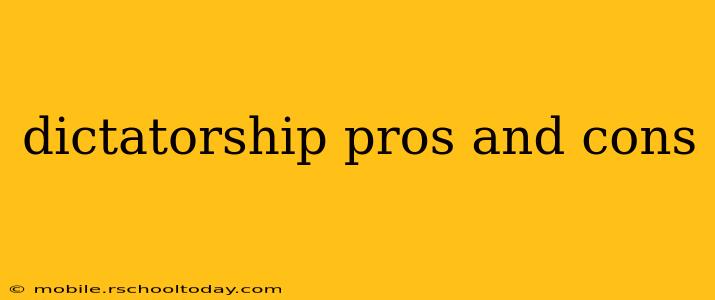Dictatorships, characterized by absolute power concentrated in a single person or a small group, represent a stark contrast to democratic systems. While often associated with oppression and human rights abuses, analyzing the purported "pros" and "cons" offers a nuanced understanding of this complex form of governance. It's crucial to remember that the purported benefits are almost always outweighed by the severe human cost.
Perceived Advantages of Dictatorship: A Critical Examination
Proponents of dictatorship, often retrospectively justifying past regimes, point to certain perceived advantages, though these are highly debatable and often lack empirical evidence:
1. Efficiency and Decisiveness:
One argument suggests that dictatorships can implement policies and reforms quickly and efficiently, bypassing the often-slow and cumbersome processes of democratic debate and compromise. This streamlined approach is sometimes seen as beneficial during times of crisis or for undertaking large-scale infrastructure projects. However, this efficiency often comes at the expense of public input, leading to ill-conceived policies and projects.
2. Stability and Order:
Dictatorships can create an environment of perceived stability and order by suppressing dissent and opposition. This can be attractive in societies grappling with internal conflict or political instability. However, this "stability" is frequently achieved through fear and repression, creating a society stifled by conformity and devoid of genuine progress. The underlying tension often leads to violent uprisings once the dictator's grip weakens.
3. National Unity and Purpose:
Some argue that dictatorships can foster a sense of national unity and purpose by presenting a strong, centralized vision. This often involves promoting a nationalist ideology that can rally the population around a common cause. However, this unity is artificial and often built on propaganda and the suppression of dissenting voices, leading to a fragile and potentially explosive situation.
The Overwhelming Disadvantages of Dictatorship: A Reality Check
The drawbacks of dictatorship far outweigh any perceived advantages. The negative consequences often manifest in pervasive and long-lasting harm:
1. Human Rights Abuses:
The most significant drawback of dictatorship is the widespread violation of human rights. Freedom of speech, assembly, and the press are almost always suppressed. Political opponents are persecuted, imprisoned, or even eliminated. Torture and extrajudicial killings are common. The absence of checks and balances ensures accountability is virtually nonexistent.
2. Economic Inefficiency and Corruption:
While speed of implementation might seem beneficial, lack of transparency and accountability in dictatorships often leads to economic inefficiency and widespread corruption. Resources are frequently misallocated, benefiting the ruling elite at the expense of the general population. This can stunt economic growth and lead to widespread poverty.
3. Lack of Accountability and Transparency:
The absence of free and fair elections and independent oversight mechanisms means that dictators are not accountable to their citizens. This lack of transparency fosters corruption, arbitrary rule, and the suppression of dissent. There is no pathway for redress of grievances, leading to widespread resentment and unrest.
4. Stifled Innovation and Progress:
The suppression of freedom of thought and expression in dictatorships hinders innovation and progress. Individuals are discouraged from expressing dissenting opinions or challenging the status quo, leading to a stagnant and uncreative society.
5. Instability and Violence:
While initially offering a façade of stability, dictatorships often create an environment of underlying tension and resentment. The absence of legitimate avenues for dissent can lead to violent uprisings, civil wars, and protracted periods of instability.
Conclusion: The High Cost of Authoritarianism
The purported "pros" of dictatorship are consistently overshadowed by its devastating human and societal costs. While the promise of efficiency and order might be tempting in specific contexts, the long-term consequences of unchecked power almost always lead to oppression, instability, and widespread suffering. The fundamental principles of democracy, however imperfect, offer a far superior path to progress and prosperity. History is replete with examples that consistently reinforce this conclusion.
